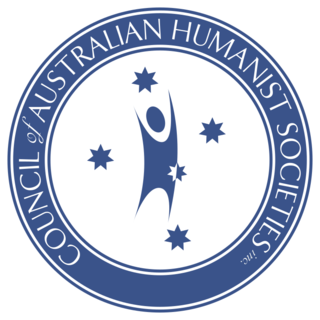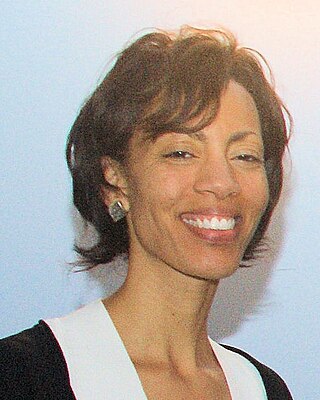Related Research Articles

Secular humanism is a philosophy, belief system or life stance that embraces human reason, secular ethics, and philosophical naturalism while specifically rejecting religious dogma, supernaturalism, and superstition as the basis of morality and decision making.

Religious humanism or ethical humanism is an integration of non-theistic humanist ethical philosophy with congregational rites and community activity which center on human needs, interests, and abilities. Self-described religious humanists differ from secular humanists mainly in that they regard the non-theistic humanist life stance as their religion while organizing with a congregational model. Religious humanism is sometimes referred to as non-theistic religion or congregational humanism.
Irreligion is the active rejection of religion in general, or any of its more specific organized forms, as distinct from absence of religion. The Oxford English dictionary defines it as want of religion; hostility to or disregard of religious principles; irreligious conduct. Irreligion takes many forms, ranging from the casual and unaware to full-fledged philosophies such as atheism and agnosticism, secular humanism and antitheism. Social scientists tend to define irreligion as a purely naturalist worldview that excludes a belief in anything supernatural. The broadest and loosest definition, serving as an upper limit, is the lack of religious identification, though many non-identifiers express metaphysical and even religious beliefs. The narrowest and strictest is subscribing to positive atheism.

The Council of Australian Humanist Societies (CAHS) is an umbrella organisation for Australian humanist societies. It was founded in 1965. It is affiliated with Humanists International. The official symbol of CAHS is the Happy Human.

Atheism, agnosticism, scepticism, freethought, secular humanism or general irreligion are increasing in Australia. Post-war Australia has become a highly secularised country. Religion does not play a major role in the lives of much of the population.
According to the Pew Research Center in a 2014 survey, self-identified atheists make up 3.1% of the US population, even though 9% of Americans agreed with the statement "Do not believe in God" while 2% agreed with the statement "Do not know if they believe in God".
Irreligion in New Zealand refers to atheism, agnosticism, deism, religious scepticism and secular humanism in New Zealand society. Post-war New Zealand has become a highly secular country, meaning that religion does not play a major role in the lives of many of the population.
This is a list of articles in philosophy of religion.
As of 2020, 20% of Singaporeans have no religious affiliation. The rate of irreligion is different among ethnic groups of Singapore: about 26% of Chinese residents have no religion, compared to just 0.4% of Malay residents and 2.2% of Indian residents. Age is an also important factor, as around 24% of people aged 15 to 24 indicated they had no religious connection, compared to 15% of residents aged 55 and over in the last census.

Sikivu Hutchinson is an American author who writes on the topics of feminism and atheist. She is the author of Humanists in the Hood: Unapologetically Black, Feminist, and Heretical (2020), White Nights, Black Paradise (2015), Godless Americana: Race and Religious Rebels (2013), Moral Combat: Black Atheists, Gender Politics, and the Values Wars (2011), and Imagining Transit: Race, Gender, and Transportation Politics in Los Angeles (2003). Moral Combat is the first book on atheism to be published by an African-American woman. In 2013 she was named Secular Woman of the year and was awarded Foundation Beyond Belief's 2015 Humanist Innovator award, and the Secular Student Alliance's 2016 Backbone award.
Irreligion in the United Kingdom is more prevalent than in some of Europe, with about 8% indicating they are atheistic in 2018. A third of Anglicans polled in a 2013 survey doubted the existence of God, while 15% of those with no religion believed in some higher power, and deemed themselves "spiritual" or even "religious."
Irreligion in the Netherlands pertains to atheism, agnosticism, and other forms of irreligion in the Netherlands. Irreligion is the majority religious position in the country, and the Netherlands is one of the most irreligious countries in the world.
Irreligion is common in Sweden, and Sweden is one of the most secular nations in the world. The majority of Swedish citizens are members of the Church of Sweden, but very few are practicing members. Sweden has legally been a secular state since 2000 when the Church of Sweden was separated from the state.
China has the world's greatest irreligious population, and the Chinese government and the ruling Chinese Communist Party (CCP) is officially atheist. Despite limitations on certain forms of religious expression and assembly, religion is not banned, and religious freedom is nominally protected under the Chinese constitution. Among the general Chinese population, there are a wide variety of religious practices. The Chinese government's attitude to religion is one of skepticism and non-promotion.
Irreligion in Nigeria is measured at less than one percent of the population. As in many parts of Africa, there is a great amount of stigma attached to being an atheist.

Atheism in the African diaspora is atheism as it is experienced by black people outside of Africa. In the United States, blacks are less likely than other ethnic groups to be religiously unaffiliated, let alone identifying as atheist. The demographics are similar in the United Kingdom. Atheists are individuals who do not hold a belief in God or gods. Atheism is a disbelief in God or gods or a denial of God or gods, or it is simply a lack of belief in gods. Some, but not all, atheists identify as secular humanists, who are individuals who believe that life has meaning and joy without the need for the supernatural or religion and that all individuals should live ethical lives which can provide for the greater good of humanity. Black atheists and secular humanists exist today and in history, though many were not always vocal in their beliefs or lack of belief.
Irreligion in Romania is rare. Romania is one of the most religious countries in Europe, with 92% of people saying that they believe in God. Levels of Irreligion are much lower than in most other European countries and are among the lowest in the world. At the 2011 census, only 0.11% of the population declared itself atheist, up from the 2002 census, while 0.10% do not belong to any religion.
Irreligion in Peru refers to atheism, deism, religious skepticism, secularism, and humanism in Peruvian society. According to article 2 of the Peruvian Constitution: "No person shall be persecuted on the basis of his ideas or beliefs". According to the 2017 Peruvian Census data, 1,180,361 Peruvians or 5.1% of the population older than 12 years old describes themselves as being irreligious, but some sources put this number higher at 8.2%.
The Humanist Association of Ghana (HAG) is a humanist organization of atheists and agnostics living in Ghana who espouse humanism as a way of life, fight for the protection of human rights and promote critical thinking.
References
- ↑ "Humanism In Ghana". Modern Ghana. Retrieved 2014-03-17.
- 1 2 ZUCKERMAN, P. (2009). Atheism and Secularity. ABC-CLIO. p. 75. ISBN 9780313351822.
- ↑ "Humanists call for African age of "Enlightenment"". Reuters. Retrieved 2012-12-09.
- ↑ "Global Index of Religiosity and Atheism" (PDF). Gallup . Retrieved 2012-09-02.
- ↑ "Ghana - 2010 Population and Housing Census" (PDF). Ghana Statistics Service. Government of Ghana. 2010. Archived from the original (PDF) on 25 September 2013. Retrieved 22 July 2013.
- ↑ "2010 Population & Housing Census" (PDF). Statsghana.gov.gh. Archived from the original (PDF) on 2013-09-25. Retrieved 2016-05-20.
- 1 2 "In world's most religious country, humanists rally for secular space". CS Monitor . Retrieved 2012-12-07.
- ↑ Daily Guide. "Mzbel Gets Support -For Saying Jesus Christ Is Fake". www.modernghana.com. Retrieved 2015-02-19.
- ↑ "The lonesome life of Ghana's atheists" . Retrieved 18 February 2017.
- ↑ "What's Up Africa: Looking for Ghana's atheists". 4 May 2016. Retrieved 18 February 2017– via www.bbc.co.uk.
- ↑ "National Commission On Culture" . Retrieved 18 February 2017.
- ↑ "The lonesome life of Africa's atheists" . Retrieved 18 February 2017.